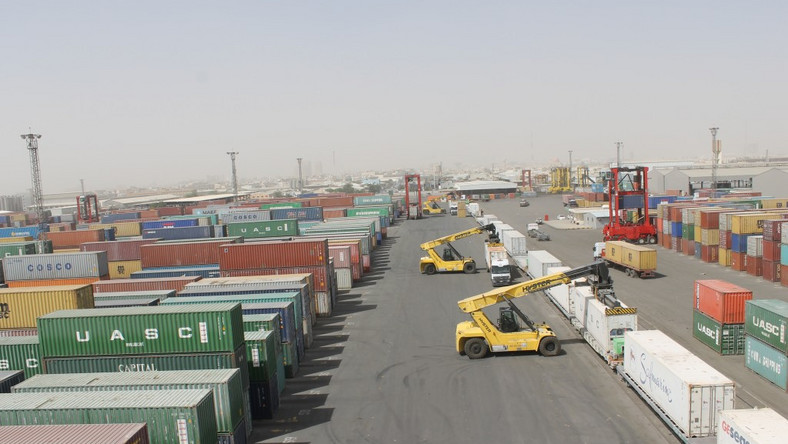By Muhammad Garba
The Dala Inland Dry Port (DIDP), which the people of Kano had been dreaming of for years and in the pipeline for 20 years before the coming of the present administration, will be delivered in the second quarter of this year.
As a clear indication that the project is starting on a positive note, Presidents of Niger Republic, Cameroon, Tchad and Central Africa, have indicated interest to come and fully patronise the multi-billion Naira signature project when it takes-off. And as a prelude to the commencement of its operations, the administration of Governor Abdullahi Umar Ganduje unveiled theme and logo of an International Summit on the Dry Port which brought together all the citizens of Kano, both those at home and those in diaspora, friends and lovers of Kano and businessmen and women from all over the world.
- NIGERIA DAILY: Journey Into The Banditry Ravaging Northern Nigeria
- Armed robbers kill Benue bizman, 1 other
The summit discussed this strong economic enabler, a transport and logistics vehicle, the 20,000 Twenty-Two-foot Equivalent Unit DIDP poised to grow the Kano economy. It is important to us in view of its significance towards growing the Kano economy by creating jobs for all natives and residents, but, improving the socio-economic well-being of the entire citizenry.
The interest by the administration in Kano was in realisation of the enormous opportunities being presented by the efforts of the government of President Muhammad Buhari and resolve to take appropriate steps to fully key into them.
The DIDP is also poised to transpose Kano’s status as the centre of commerce of the Sahel region of Africa. It had in the past relied on transportation of large volumes of cargo on the backs of camels, and a major national gateway for imports and exports in the country. Kano was at some time the largest contributor to the national Gross Domestic Products (GDP). Virtually all exports out of the country were non-oil products.
It was also realised that the Kano exporters which include exporters from neighbouring states and countries notably, Niger and Chad Republics and the northern Cameroon, suffer untold hardship and losses in the process of receiving their imports or forwarding their exports. The hardship coupled with the exorbitant transport costs have pushed so many very committed businessmen out of business.
DIDP is one of the inland container depots approved to be set up in various parts of the country then, with emphasis on areas lacking seaports. Its establishment was long overdue because of the economic significance of the state, its strategic position and the strategic link it would provide to trade development within northern Nigeria and other Western African countries.
The project, which faced many hiccups over the years, is a 20,000 twenty-foot equivalent unit inland dry port for transport and logistics zone on a Private-Public-Partnership (PPP) scheme, which was initially conceptualised as concession-based, where the government was to build, equip and appoint concessionaire to man, operate and render returns and eventually return the project to the government for other terms to be reviewed.
The DIDP has the potential to reduce the cost of doing business in the state, as well as the generation of millions of dollars in terms of revenue to the state’s coffer, as it will be leveraging on the role of the state on the frontier markets in Nigeria. It is also expected to be a critical component in the take-off of the Special Economic Zones initiative of the Nigerian government in the North West geo-political zone of the country, brings shipping services to the doorstep of shippers across the nation, assist in decongesting the seaports and make them more user friendly.
Other projects to complement the re-industrialisation programme is the ongoing construction of the new Kano Economic City located at Dangwauro Town along Kano-Zaria Federal Highway. The economic city will be of immense benefit to our industries as international standard ware houses for the storage of finished goods that include agricultural-based and pharmaceutical companies will be constructed.
While the Ganduje administration is making effort to develop other infrastructure in Kano, the federal government invests massively in the revival of the Kano Free Trade Zone (KFTZ), Panisau in Ungogo Local Government Area to stimulate industrial activity as a key enabler of industrialisation, where it will be licensing, monitoring and regulating the activities of enterprises operating in the zone. The trade zone is also aimed at overcoming the difficulties and challenges companies encounter, especially in the areas of infrastructural development, functional amenities, taxation and high cost of production or overheads .
Already, the federal government had signed a 25 megawatt IPP project agreement in February to supply electricity to industries in the KFTZ. The project is scheduled to be completed within 11 months.
Other benefits include assisting in the overall costs of cargo to hinterland locations and transit cargoes to landlocked countries, encouraging exports among African countries and growing their economies as well as implementation of the Africa Continental Free Trade Area (AfCFTA) Agreement.
Specifically, for the people of Kano, the concessionaire believes the project would bring improved efficiency in the import and export of cargoes because the time it takes for a cargo to get out of Apapa port and get on the road by truck is about six to seven days. From that point, to get to Kano takes about two weeks .This is in addition to lessening the suffering transporters go through as result of bad roads and the risk of shifting and damages.
It is also to provide the impetus to revive and modernise the railway as a primary mode for long-distance haulage. There is also the Kano-Maradi rail project which traverses the major commercial centre of Kano and passes through other economic hubs of the country including Kazaure, Daura, Katsina Mashi and up to the border town of Jibiya and the Niger Republic city of Maradi. Another rail line by the federal government is the one linking Kano-Kaduna which will commence in July and is also billed to solve the problem of cargoes and control of the volume of human traffic in Kano.
Garba is the Commissioner for Information, Kano State

 Join Daily Trust WhatsApp Community For Quick Access To News and Happenings Around You.
Join Daily Trust WhatsApp Community For Quick Access To News and Happenings Around You.


